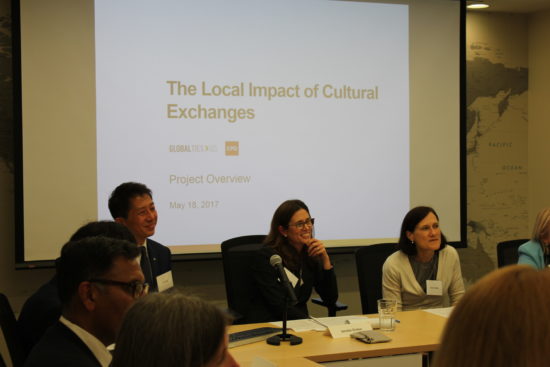
Representatives of USC CPD, Global Ties U.S. and U.S. Department of State (Credit: Global Ties U.S.)
From the earliest days of statecraft, cultural exchanges have enjoyed enduring importance as a means of promoting peace and mutual understanding while supporting foreign policy objectives. Last fall, the USC Center on Public Diplomacy (CPD) and Global Ties U.S began a multi-year evaluation of exchange programs using the impact of in-person, immersive experiences offered by the International Visitor Leadership Program (IVLP) as a test case.
Prior research of IVLP programs has focused on assessing their impact on the international visitors participating in the exchange by documenting their visitor experience, program satisfaction, and multiplier effect after their return to their home countries. While this research reveals the multi-cultural impact of exchanges on the international participants, it does not provide much insight into the impact these exchanges have on the local host communities themselves. This local impact is an indispensable aspect of the larger goal of creating mutual understanding through cultural diplomacy, and ways of assessing this impact remain under-scrutinized. Enter the CPD-Global Ties U.S. research project.
In November 2016, CPD started a pilot research project with six Global Ties U.S. community-based members, including the International Visitors Council of Los Angeles, San Diego Diplomacy Council, Presidential Precinct, Citizen Diplomacy International in Philadelphia, Cleveland Council on World Affairs, and Global Ties Akron.
Through an extensive literature review, individual site visits to each of these six organizations, focus groups and discussions, and the distribution of survey tools to each community-based member, CPD aims to assess how international exchanges can mutually benefit local communities around the United States. The assessment analyzes how increased local knowledge of international affairs, enhanced global social interactions and cross-cultural communication skills, increased community spirit and volunteerism, and expanded business and professional connections can impact those communities. The project intends to provide empirical evidence to the entire Global Ties Network and its partners in an effort to broaden and strengthen understanding of and support for international exchange.
On May 18, CPD and Global Ties U.S. held a workshop for exchange professionals at Global Ties U.S. headquarters in Washington, DC to provide a status update on progress, solicit feedback and generate possible study refinements. The event included a moderated Q&A session as well as breakout groups. Participants represented a cross-section of public and private sector representatives from exchange organizations, universities, diplomatic missions, and the U.S. Department of State.
As the pilot stage completes the collection of the survey results and consolidates the findings this summer, CPD will produce an analytical report with valuable empirical evidence to empower local member organizations through identifying, demonstrating and modeling effective and efficient practices. Global Ties U.S. will share this data across the Network. The study will continue with a second phase, which will see expansion beyond the pilot cities and will have broader relevance to other types of exchanges.
By Madison Jones, Student Fellow, USC Center on Public Diplomacy
